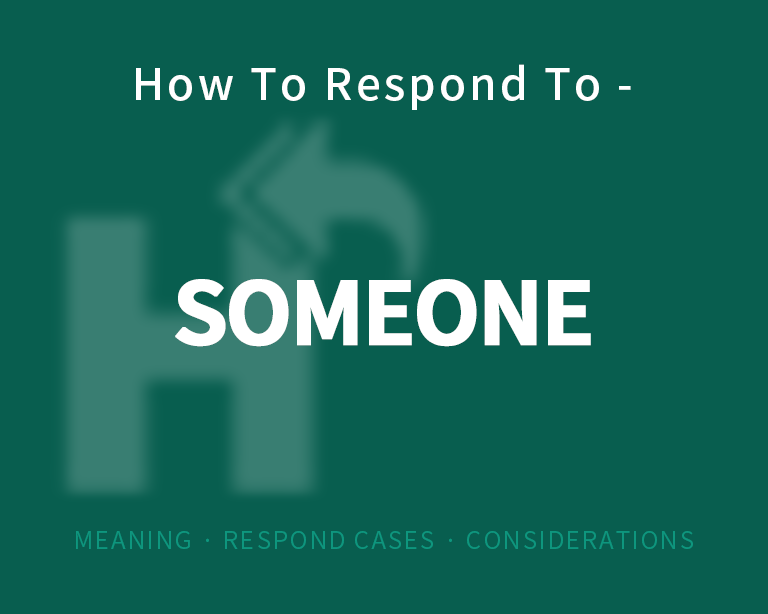The Best Way to Respond to Someone?

Communication is an essential part of our lives, and it involves both speaking and listening. However, many of us struggle with how to respond to other people's words, especially when the situation is sudden or unexpected. In this essay, we will explore why we don't know how to respond, what we need to pay attention to when responding, and how to respond correctly to someone else's remark.
Why We Don't Know How to Respond
One of the main reasons why we struggle with responding to other people's words is that we often don't know what to say. Sometimes, we might be caught off guard by someone else's statement or question, and we don't have an immediate answer. Other times, we might feel overwhelmed by our emotions, such as anger or sadness, and we can't think clearly. In these situations, we might say something that we regret later, or we might remain silent, which can make the other person feel ignored or dismissed.
Another reason why we don't know how to respond is that we might be afraid of saying the wrong thing. We might worry that our response will be judged or criticized, or that we will hurt the other person's feelings. This fear can lead to hesitation or avoidance, which can make the situation worse. For example, if someone is sharing their feelings with us, and we don't respond in a supportive way, they might feel rejected or misunderstood.
What We Need to Pay Attention to When Responding
When responding to someone else's words, there are several things we need to pay attention to:
1. Tone of voice
The tone of our voice can convey a lot of information about our emotions and intentions. If we sound angry or defensive, the other person might feel attacked or threatened. On the other hand, if we sound calm and empathetic, the other person might feel heard and understood. Therefore, it's essential to pay attention to our tone of voice when responding to someone else's words.
2. Body language
Our body language can also communicate a lot about our feelings and attitudes. For example, if we cross our arms or avoid eye contact, the other person might perceive us as defensive or disinterested. On the other hand, if we lean forward and make eye contact, the other person might feel that we are engaged and attentive. Therefore, it's important to be aware of our body language when responding to someone else's words.
3. Content of the message
The content of our response is also crucial. We need to make sure that we understand what the other person is saying and respond appropriately. If we don't understand, we should ask clarifying questions to ensure that we are on the same page. We should also avoid making assumptions or jumping to conclusions. Instead, we should try to listen actively and respond thoughtfully.
4. Timing
Timing is also important when responding to someone else's words. If we respond too quickly, we might not have had time to process the information fully, and our response might be impulsive or inappropriate. On the other hand, if we take too long to respond, the other person might feel ignored or dismissed. Therefore, we need to find a balance between responding quickly and taking enough time to think through our response.
How to Respond Correctly to Someone Else's Remark
When responding to someone else's remark, there are several strategies we can use to ensure that we respond correctly:
1. Acknowledge the other person's words
The first step in responding correctly is to acknowledge the other person's words. This means that we should let the other person know that we have heard and understood what they are saying. We can do this by paraphrasing or summarizing their message, or by simply saying "I hear you" or "I understand."
2. Validate the other person's feelings
The second step is to validate the other person's feelings. This means that we should acknowledge and accept the other person's emotions, even if we don't agree with their perspective. We can do this by saying things like "I can see why you would feel that way" or "It's understandable that you're upset."
3. Respond with empathy
The third step is to respond with empathy. This means that we should try to understand the other person's perspective and respond in a way that shows that we care. We can do this by saying things like "I'm sorry that you're going through this" or "What can I do to help?"
4. Offer a solution or compromise
The final step is to offer a solution or compromise. If possible, we should try to find a way to resolve the issue or come to a mutually agreeable solution. We can do this by saying things like "Let's work together to find a solution" or "How can we make this work for both of us?"
Conclusion
Responding to other people's words can be challenging, but with practice and attention, we can become better communicators. By paying attention to our tone of voice, body language, content of the message, and timing, we can respond more effectively. By acknowledging the other person's words, validating their feelings, responding with empathy, and offering a solution or compromise, we can respond correctly to someone else's remark. Communication is a vital part of our lives, and by learning how to respond effectively, we can strengthen our relationships and build stronger connections with others.